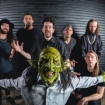There's a reason that Children of Bodom main man Alexi Laiho goes by the nickname "Wildchild"—and it's not just an homage to one of the singer-guitarist's favorite bands, W.A.S.P. It has more to do with his ability and drive to out-drink, out-rage, out-party just about any other rocker out there. Over the last decade or so, Laiho has carved a name for himself in the history books, not only with his blistering guitar work, but also for his epic intake of alcohol and for the equally epic number of related injuries he's suffered and overcome.
In 2004, Bodom were forced to cancel their appearance at a Dimebag Darrell tribute in Finland when Laiho fell onto his face and wrist, leaving him in a cast and unable to play guitar for over a month. Three years later, another fall, this time at a bowling alley, led to an injured shoulder and a six-week ban from shredding on strict doctor's orders, forcing the band to pull out of Dubai's Desert Rock festival. In 2009, things appeared to take a more serious turn when Laiho fell in the tour bus, breaking his shoulder and a number of ribs, an injury that resulted in Bodom abandoning their tour with Lamb of God. Impressively, Laiho battled through a number of shows, despite internal bleeding that left him vomiting blood backstage. All of this has undoubtedly helped to build up the man's reputation as a true rock-and-roll warrior, but such antics—along with his often-intoxicated appearances in video interviews and the like—have occasionally set alarm bells ringing, especially given the depressive periods the talented axman has discussed in the past. There comes a point where a rowdy image can threaten to overtake and destroy the man behind it, a point Laiho has recently begun to address.
Indeed, one of the reasons that Children of Bodom's new opus, Relentless Reckless Forever (Universal)—the follow-up to their bestselling album yet, 2008's Blooddrunk—sounds so big, powerful, and intricate is because Laiho and his bandmates focused less on partying hard during its making and more on playing hard. ("If Blooddrunk was 100 [bottles of vodka], this [one] was 50," keyboardist Janne "Warman" Wirman has joked.) Marrying Bodom's signature razor-sharp riffing and solid songwriting with the group's ever-impressive technical proficiency, the new record should win over even more reverent fans to the band—that is, if Laiho can keep his wild side successfully in check.
THE TITLE OF THE NEW ALBUM, RELENTLESS RECKLESS FOREVER—IS THAT MEANT AUTOBIOGRAPHICALLY?
I would say it's more about what this band—in general and musically—is all about right now. I guess the word "forever" sounds like a promise, but promises are made to be broken, I guess. We'll try, that's for sure!
ARE YOU PERSONALLY TRYING TO LIVE LESS RECKLESSLY? DO YOU EVER FEEL YOU HAVE TO HOLD BACK TO PROTECT YOUR OWN WELL-BEING?
That's how I felt after the Black Label Society tour [last year]. Pretty much straight from the recording [of Relentless], I went on tour, so I was pretty fried afterwards, I can tell you that. It wasn't just the tour—and it was a two-month tour—it was everything that happened before that, all the stress. I realized that I hadn't been to my home in, like, three and a half months... Dude, I was a fucking mess. I was so burned out that when I came back home to Helsinki, I couldn't do anything but lie on my bed for two weeks and pretty much sleep 20 hours a day.
IT DOES SEEM LIKE AN INTENSE LIFE. DO YOU THINK TO SOME EXTENT THAT THE PRICE OF SUCCESS AND FAME IS PEACE OF MIND?
I guess, but there's also the fact that I can't—and I never did—blame my profession for my personal problems. At some point I had to face the fact that—and it's really something I started thinking about after I got home—that I can't keep up with the same lifestyle as I always did. I can't slam a bottle of whiskey when I get up in the morning. OK, that's exaggerated, but you know, it got pretty harsh at some point and I didn't notice. I was still functioning as a person and as a musician, I never fucked up a show or anything, but I realized that I need to calm down. I need to take care of myself.
WAS THAT A REAL TURNING POINT FOR YOU?
The turning point was when I got back home, but it wasn't just that four months, but years of crazy shit. I was having fun, but then all of a sudden I realized that instead of having fun, I was medicating with the booze, and that's not good.
WHAT DID YOU PERSONALLY FEEL YOU WERE MEDICATING YOURSELF FROM?
It was mainly stress, which causes insomnia, which has been a problem since I was a kid. And the fact that you always have to put on a brave face. I don't know man. I don't want to go into too many details, but it happens so fucking quick that you don't notice that something is wrong, and when people tell you... Well, I'm the sort of person that when people tell me, "What are you doing, man? You should cut down," that's when I get defensive. I'm like, "Fuck that, man," and just to make a point, I'd drink even more. I know, I'm a fucking idiot, but it was a point I needed to stress. I never even considered rehab, which someone told me I should go to. I was like, "Fuck that, I can do it for myself," 'cause I don't want to be someone who's physically addicted to anything.
THE NEW ALBUM OPENS WITH A SONG TITLED "NOT MY FUNERAL." WHAT'S THE STORY BEHIND IT?
It sounds pretty dark but someone who used to be pretty close to me told me, "Dude, you're going to die," that they had got a professional opinion and it was that I was going to die in the next 10 years, and that got me so fucking pissed off. I don't need someone who's never met me saying that.
HOW DO YOU FEEL NOW ABOUT YOUR WILD-MAN IMAGE? DO YOU EVER FEEL A PRESSURE TO LIVE UP TO PEOPLE'S EXPECTATIONS OF THAT?
I did at some point, but I don't anymore, because I'm very open and I've told everyone. Honestly, it's something that I never created; I never thought, OK, I'm going to put on this image. It was always just me. But, of course, it becomes annoying. When you're on a tour, sitting somewhere with a bottle of water, doing nothing, and people come up to you and are like, "Dude, are you OK? What's wrong with you?" What am I supposed to be doing? Holding a bottle of Jameson, doing backflips off the fucking rooftop? Like, "Yeah, yeah, that's my boy." It's funny how people show their concern; they're actually worried about me when I'm drinking water and having a night off. I mean, I can still throw back cocktails and have fun, but I'm not that person any more. I feel like I've got to take care of myself for a change.
IN THE PAST YOU'VE TALKED ABOUT YOUR OWN SUICIDAL FEELINGS. DO YOU THINK PEOPLE IN THE METAL SCENE ARE MORE PRONE TO HAVING DEPRESSIVE TENDENCIES?
I wish I had the answer for that, 'cause I thought about it once. Well, more than once. But then again, I think the music is more helpful to overcome those feelings. I really do believe that. When I used to feel like that, I would put on Impaled Nazarene. Or Slayer. Something really fast and angry and that would give you an incredible adrenaline rush. Before you know it, you've forgotten about how much you hate life. You want to be the strongest one then and, I'm just speaking for myself, but that kind of music made me feel stronger.
A LOT OF PEOPLE WILL BE ABLE TO RELATE TO THAT. WOULD YOU SAY IN THAT SENSE THAT METAL HELPED SAVE YOU, OR AT LEAST BROUGHT YOU BACK TO A STRONGER PLACE?
Well, hopefully that's not going to be the headline for the interview! [Laughs] But yeah, a couple of times at least, it was a part of it.
It was just willpower—nothing pharmaceutical—and what gave me the willpower was the music. It sounds like I could be making this shit up, but why would I? I'd come up with a cooler story. I decided I never wanted to feel like that again, that depression and lack of will to live. I was lucky enough to be given the opportunities to get where I was and that was something that helped with my self-esteem. And then you could actually admit that you enjoyed life instead of being miserable all the time. It takes years to get over and years of work and it wasn't always easy but what are you going to do? Shit happens. But I got over it. If I didn't have the music, that really could have been the end of me.
WAS ANOTHER PART OF IT YOUR GUITAR PLAYING? IS THAT THERAPEUTIC?
The guitar thing is a separate issue really, but writing metal songs, it did help me out a lot, it was a healthy way to vent those kind of feelings. You can always break shit, you can always throw a bottle of whiskey at your TV or you can go out and beat people up, a lot of people do that. But you can also write a metal song, and that's a healthier way to do that.
YOU SAID THAT PLAYING GUITAR IS SOMETHING DIFFERENT—WHAT WOULD YOU SAY YOUR RELATIONSHIP WITH YOUR INSTRUMENT IS?
Pure, unconditional love. Playing guitar is something that, you know, if I would ever dread losing something, that'd be the first thing that came into my mind. I really love it and even just holding the guitar; that's when I feel like a whole person.
WOULD YOU SAY THAT YOU'RE A WORKAHOLIC?
Well, I'm some kind of 'holic, yeah! [Laughs] Just kidding. I am, yeah, but I enjoy it. I don't feel good about myself if I don't keep working. I will never let anyone get between me and music. That's just the way it is.












